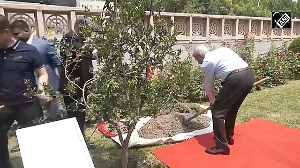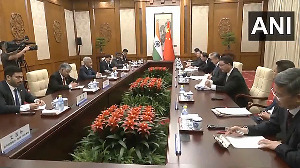The debate over Prime Minister Modi’s nixed Congressional address continues. Aziz Haniffa has the scoop
 United States Representatives Brad Sherman of California and Eni Faleomavaega of American Samoa are disappointed with House Speaker John Boehner’s decision to not invite Indian Prime Minister Narendra Modi to address a joint session of the US Congress.
United States Representatives Brad Sherman of California and Eni Faleomavaega of American Samoa are disappointed with House Speaker John Boehner’s decision to not invite Indian Prime Minister Narendra Modi to address a joint session of the US Congress.
The opportunity to address a joint session of the House and Senate is the highest honour Congress can bestow on a visiting foreign leader.
Sherman and Faleomavaega, senior members of the House Foreign Affairs Committee, were the main drivers of the campaign urging the Congressional leadership to invite Prime Minister Modi to address a joint session during his visit to Washington, DC for his summit with President Barack Obama.
Sherman and Faleomavaega are clearly not buying Boehner’s defence -- of the ‘unpredictability of the House schedule in late September’.
Sherman and Faleomavaega pointed out to India Abroad that the Congressional calendar published in January had shown that both the House and Senate would be in session September 29 and 30. And they took strong exception to the contention by some GOP sources that some Democrats led by Sherman and Faleomavaega had decided to run with their campaign to invite Modi despite knowing that the logistics of the Congressional calendar would not make such a joint address viable.
These Republican sources argued that US Representatives Ed Royce (California, Republican) and George Holding (Republican, North Carolina) had written to the Congressional leadership asking that Modi be invited to address a joint session, and got no traction with the Republican Speaker Boehner. In such a scenario, the Republican sources said, the likes of Sherman and Faleomavaega should not have started a campaign to invite Modi.
Sherman insisted he would continue to urge the House leadership to keep Congress in session September 29 through October 2. This, he argued, would allow the House to address urgent legislative business, as well as afford Prime Minister Modi an opportunity to address a joint session.
“I am pleased that 87 of my colleagues have joined me in this effort to invite Prime Minister Modi to speak before a joint session of Congress,” he said.
He pointed out that in each of the last three decades, an Indian prime minister of India has addressed a joint session of Congress.
Dismissing what he described as “widespread rumours” that the House will be closed September 29 through October 2, Sherman asserted, “Congress does not need or deserve a three-and-a-half month vacation. The country faces major problems, and we must make sure that Congress is not irrelevant to solving those problems.”
Faleomavaega, an ardent Modi admirer, told India Abroad he was troubled by the “misinformation” that was being circulated, and “how many facts about this issue have been twisted by the press, naysayers, critics and opponents.”
He argued, “First, nearly 100 members of Congress -- and maybe more -- both Republicans and Democrats, including members of the House and Senate, called upon Speaker Boehner to invite Prime Minister Modi to address a Joint Session of Congress. This was not an isolated effort by only two members of Congress. This was a full-on effort, which included the US House of Representatives’ Caucus on India and Indian Americans as well as the US Senate Caucus on India. Members from both of these powerful legislative bodies of American government stood strong in calling for an invite to be extended.”
“And so,” he said, “there is no embarrassment associated with this and why should anyone be embarrassed for standing up, speaking out and calling for the US to strengthen its ties with India?... The House calendar was published and posted online in January 2014. The calendar showed, and continues to show, that the House would be in session for September 29 and 30. The Senate calendar also showed in-session for September 29 and 30, and now shows “to be determined” for September, implying that the Senate may be in session on those dates.”
He noted, “The Senate calendar was put out by Senator (Richard) Durbin, a Democrat (from Illinois) and Senator (John) Cornyn, a Republican (from Texas), who, by the way, signed the letter calling for Prime Minister Modi to speak before a joint session of Congress. As for the House calendar, the Republicans control it and can change it any time. As for a joint session, it is the Speaker’s decision. And so, while I have the utmost respect for Speaker Boehner, I wish the Speaker would have chosen to hold fast to the published calendar so that Congress could have moved forward with what would have been and will one day be one of the most historic joint sessions of Congress ever to be held.”
He added, “Instead, the Speaker has opted to possibly cut the calendar short for the sake of upcoming November elections. That is his prerogative and one that Prime Minister Modi will understand, having just undergone a very gruelling campaign himself.”
Faleomavaega said, “Speaker Boehner is a good man. Speaker Boehner will, in due time, after November elections are behind us, extend to Prime Minister Modi an invitation to speak before a joint session of Congress.”
Faleomavaega said his “sincere hope is that the media will report this issue accurately and not politicise it. All involved acted rightly and all who called for a joint session of Congress should be duly commended for doing so.”
US Representative Dr Ami Bera (Democrat, California), the only Indian American in Congress who was among those spearheading this campaign, told India Abroad, “Given the challenges and opportunities America faces in the 21st century, and with our pivot to Asia, I believe a strong US-India partnership is pivotal. That’s why a bipartisan group of my colleagues and I encouraged Speaker Boehner to invite Prime Minister Modi to address a joint session of Congress. With all the work that we need to complete, including passing a jobs bill, and an infrastructure bill, and extending the Export-Import bank, I expected we’d be in session during Prime Minister Modi’s visit.”
“I’m disappointed the Speaker has announced we won’t be having a joint session of Congress during this visit, but I am still looking forward to Prime Minister Modi’s upcoming visit to the US, to participating in a joint session with him in the future, and to reinvigorating our ties with an important friend and partner,” Dr Bera added.
USINPAC, which had launched a grassroots campaign two months ago, exhorting the Indian-American community to urge their lawmakers to urge Speaker Boehner to schedule a joint session to be addressed by Modi, threw in the towel.
It said, ‘USINPAC hopes to continue its dialogue with the US Congress in order to support accelerated US-India strategic partnership and an effective working relationship with the new government in India.’
Foreign Policy, in its daily newsletter The Cable, wrote, ‘Now, the scheduling conflict could be perceived as yet another slight by the US government at a time of slumping US-India relations.’
It quoted Tanvi Madan, director of the India Program at The Brookings Institution, saying, ‘Since the expectation of a speech was made public ... Indian and American policymakers are now going to have to manage the disappointment that results from it not materialising. This’ll require making sure there’s an understanding in India --especially with the media and public -- that this is not a sign of disrespect to India or Modi, but a result of the Congressional calendar, especially in a mid-term year.’
Image: United States Representative Brad Sherman of California











